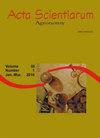Brassinosteroid application increases tomato tolerance to salinity by changing the effects of stress on membrane integrity and gas exchange
IF 1.2
4区 农林科学
Q3 AGRONOMY
引用次数: 1
Abstract
Salinity is one of the environmental stresses that most cause losses in agricultural systems, including tomato production. Brassinosteroids, such as epibrassinolide (EBL), have multiple actions in essential processes in plants. Thus, the objective of this study was to evaluate the contributions of EBL to the growth, physiology, and production of tomato plants under salinity. The experiment was conducted in a factorial scheme, with five levels of water salinity (0.5 [the control], 1.5, 3.0, 4.5, and 6.0 dS m-1) and two concentrations of EBL (0 and 10-6 M). Salt stress reduced tomato growth, relative water content, membrane integrity, gas exchange, and fruit production. However, the exogenous application of EBL attenuated the adverse effects, partially improving these characteristics at all salinity levels. EBL reduced electrolyte leakage and increased membrane integrity and relative water content in control and stressed plants. Additionally, it increased the content of photosynthetic pigments, stomatal conductance, transpiration, and photosynthesis, which led to higher leaf dry mass production, fruit transverse diameter, and production per plant. Therefore, our results confirmed that foliar application of EBL improved the characteristics of stressed and non-stressed tomato plants.油菜素内酯通过改变胁迫对膜完整性和气体交换的影响,提高了番茄的耐盐性
盐分是造成包括番茄生产在内的农业系统损失最多的环境压力之一。油菜素内酯,如表油菜素内酯(EBL),在植物的基本过程中具有多种作用。因此,本研究的目的是评估EBL对盐胁迫下番茄植株生长、生理和生产的贡献。试验采用因子方案,在5个盐度水平(0.5[对照]、1.5、3.0、4.5和6.0 dS - M -1)和2个浓度(0和10-6 M)条件下,盐胁迫降低了番茄的生长、相对含水量、膜完整性、气体交换和果实产量。然而,外源施用EBL减轻了不利影响,部分改善了所有盐度水平下的这些特性。EBL减少了电解质泄漏,增加了对照和胁迫植株的膜完整性和相对含水量。此外,增加了光合色素含量、气孔导度、蒸腾和光合作用,提高了叶片干产量、果实横径和单株产量。因此,我们的研究结果证实,叶面施用EBL改善了胁迫和非胁迫番茄植株的特性。
本文章由计算机程序翻译,如有差异,请以英文原文为准。
求助全文
约1分钟内获得全文
求助全文
来源期刊

Acta Scientiarum. Agronomy.
Agricultural and Biological Sciences-Agronomy and Crop Science
CiteScore
2.40
自引率
0.00%
发文量
45
审稿时长
>12 weeks
期刊介绍:
The journal publishes original articles in all areas of Agronomy, including soil sciences, agricultural entomology, soil fertility and manuring, soil physics, physiology of cultivated plants, phytopathology, phyto-health, phytotechny, genesis, morphology and soil classification, management and conservation of soil, integrated management of plant pests, vegetal improvement, agricultural microbiology, agricultural parasitology, production and processing of seeds.
 求助内容:
求助内容: 应助结果提醒方式:
应助结果提醒方式:


